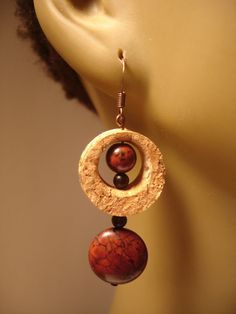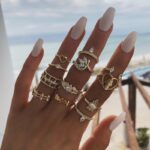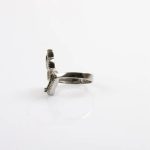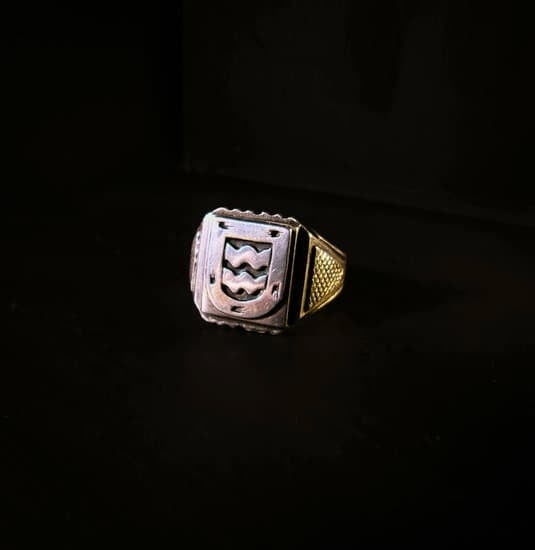Can I use fine electrical rosin core solder for jewelry making? Soldering is an essential technique in jewelry making, and choosing the right type of solder is crucial for achieving high-quality results.
There are various types of solder available, including fine electrical rosin core solder, which raises the question of whether it can be used effectively in jewelry making. In this article, we will explore the use of solder in jewelry making, specifically focusing on the potential use of fine electrical rosin core solder.
In order to understand whether fine electrical rosin core solder can be used for jewelry making, it’s important to first define what this type of solder is and its typical uses. Additionally, we’ll highlight the differences between electrical solder and jewelry solder to better understand the potential implications of using fine electrical rosin core solder in jewelry making.
We will then delve into the practicality and potential risks associated with using fine electrical rosin core solder for jewelry making and weigh the pros and cons of utilizing this type of solder in the context of creating jewelry. Furthermore, safety considerations and precautions when using fine electrical rosin core solder for jewelry will also be addressed, along with exploring alternative solder options that may be more suitable for jewelry making.
What Is Fine Electrical Rosin Core Solder
The soldering process is a crucial technique in jewelry making, as it allows for the joining of metal components to create intricate designs. There are various types of solder available for this purpose, including fine electrical rosin core solder. This type of solder is commonly used in electrical work due to its flux-filled core, but can it be used for jewelry making?
Fine electrical rosin core solder is primarily composed of tin and lead, and often contains a rosin-based flux within its core. The flux aids in the flow of the molten solder and helps clean the metal surfaces being joined. While this type of solder is designed for electronic and electrical applications, some jewelers have considered using it due to its availability and cost-effectiveness.
However, there are significant differences between electrical solder and jewelry solder that need to be taken into consideration. In jewelry making, it is standard practice to use lead-free solders due to health and safety concerns. Additionally, jewelry solders are specifically formulated with precious metals such as gold or silver in mind, ensuring a seamless finish without discoloration or compromising the quality of the piece.
When considering whether fine electrical rosin core solder can be used for jewelry making, it’s important to weigh these differences and potential risks. While it may seem like a convenient option, using this type of solder in jewelry making could result in compromised structural integrity or undesirable effects on the metal composition. Therefore, caution should be exercised when deciding whether to use fine electrical rosin core solder for jewelry purposes.
| Pros | Cons |
|---|---|
| Appropriate for small-scale projects | Contains toxic lead content |
| Inexpensive option | Potential compromise on structural integrity |
| Availability in many hardware stores | Risk of discoloration on precious metals |
Differences Between Electrical Solder and Jewelry Solder
What is the difference between electrical solder and jewelry solder? Electrical solder, including fine electrical rosin core solder, is commonly used for electronics and other electrical work. It is typically made of a combination of tin and lead, with a flux core to aid in the soldering process. On the other hand, jewelry solder is specifically formulated for use in jewelry making and is available in various compositions, such as silver, gold, or brass.
The main distinction between electrical solder and jewelry solder lies in their composition and intended use. While electrical solder may contain lead or other metals that can produce toxic fumes when heated, jewelry solder is often formulated to be lead-free and safe for direct skin contact. Additionally, jewelry solder usually has a lower melting point than electrical solder to avoid damaging delicate gemstones or heat-sensitive materials commonly used in jewelry making.
Using fine electrical rosin core solder for jewelry making may not provide the desired results due to its high melting point and different metal composition compared to traditional jewelry solder. It may also pose health risks if used improperly or without adequate ventilation due to the presence of lead in some formulations. Therefore, it is important to always use the appropriate type of solder designed for jewelry making to achieve professional-quality results while ensuring safety.
In summary, the differences between electrical solder and jewelry solder are significant when it comes to their suitability for specific applications. While electrical solders are designed for electronic work and may contain potentially harmful substances such as lead, jewelry solders are tailored for creating pieces that come into direct contact with the skin and are composed of non-toxic materials like silver or gold.
Therefore, it is crucial to select the right type of solder when working on jewelry projects to ensure both quality craftsmanship and safety.
| Differences Between Electrical Solder | Jewelry Solder |
|---|---|
| Composition includes tin and lead | Available in various compositions such as silver, gold or brass |
| High melting point | Lower melting point than electrical solders |
| Safety concerns due to potential toxic fumes from lead | Lead-free options suitable for direct skin contact |
Can Fine Electrical Rosin Core Solder Be Used for Jewelry Making
Fine electrical rosin core solder is commonly used in electrical work due to its ability to create strong and reliable connections. However, when it comes to jewelry making, there are several factors to consider before using this type of solder.
The main component of fine electrical rosin core solder is tin, with a small percentage of lead. While some jewelry makers may opt for lead-containing solders for certain applications, it is important to note that lead exposure can pose health risks, especially during the soldering process. When heated, lead can release toxic fumes which can be harmful if inhaled.
Despite its strength and conductivity, fine electrical rosin core solder may not be the most practical option for jewelry making due to its high melting point. This type of solder typically melts at a higher temperature, which could potentially damage delicate jewelry components such as gemstones or crystals. Furthermore, the color of the solder may not complement the aesthetic of certain jewelry pieces.
Moreover, fine electrical rosin core solder is designed for metal-to-metal bonds and may not adhere well to non-metal materials frequently used in jewelry making such as glass or ceramics. As a result, using this type of solder for jewelry making may present challenges when trying to achieve durable and visually appealing connections between different elements of a piece.
- High potential for lead exposure
- High melting point
- May not adhere well to non-metal materials
Pros and Cons of Using Fine Electrical Rosin Core Solder for Jewelry
Fine electrical rosin core solder can be used for jewelry making, but there are both advantages and disadvantages to consider before using this type of solder. One advantage of using fine electrical rosin core solder for jewelry is its strong bond and durability. The rosin core provides flux which aids in the soldering process by removing oxidation from the metals being joined. This can result in clean, reliable joints in jewelry pieces.
Another advantage of this type of solder is that it is readily available at hardware stores and is typically more affordable than specialty jewelry solder. This makes it a convenient option for beginners or hobbyists who may not have access to specialized jewelry making materials. Additionally, the thin diameter of fine electrical rosin core solder makes it suitable for delicate jewelry work where precision is required.
However, there are also some drawbacks to using fine electrical rosin core solder for jewelry making. One potential disadvantage is the higher melting temperature of electrical solder compared to jewelry-specific solders. This can pose a risk of damaging or discoloring the delicate metals commonly used in jewelry making. Additionally, certain types of rosin core solders may leave behind residues that could negatively affect the appearance and quality of the finished piece.
It’s important to weigh these pros and cons carefully when deciding whether to use fine electrical rosin core solder for jewelry making. While it offers convenience and strength, it also presents potential risks that should be taken into consideration before using it on precious metal pieces.
Safety Considerations
When using any type of solder for jewelry making, it is crucial to consider the safety implications and take necessary precautions. Fine electrical rosin core solder is commonly used in electrical applications, but some jewelry makers may wonder if it is safe to use for their craft. Understanding the safety considerations when using this type of solder for jewelry is essential to ensure the well-being of the maker and the quality of the final product.
Lead Exposure and Handling
One of the primary safety concerns when using fine electrical rosin core solder for jewelry making is lead exposure. This type of solder typically contains lead, which can pose health risks if proper handling procedures are not followed. It is important to work in a well-ventilated area and use a respirator mask to minimize inhalation of lead fumes. Additionally, always wash hands thoroughly after handling solder and avoid touching your face or food while working with it.
Proper Equipment and Tools
Using the right equipment and tools can also contribute to safety when working with fine electrical rosin core solder for jewelry making. Ensure that you have a dedicated workspace with a suitable ventilation system in place. It is also essential to have heat-resistant gloves to protect your hands from burns during the soldering process. Furthermore, using specialized jewelry-making tools like tweezers and clamps can help minimize direct contact with the hot solder, reducing the risk of injury.
Storage and Disposal
Proper storage and disposal of fine electrical rosin core solder are critical aspects of safety considerations. Store the solder in a secure container away from moisture, high temperatures, and direct sunlight to maintain its integrity. When disposing of used or excess solder, follow local regulations for hazardous waste disposal to prevent environmental contamination. By being mindful of these storage and disposal practices, you can minimize potential hazards associated with fine electrical rosin core solder in your jewelry making endeavors.
Each of these safety considerations should be taken into account before deciding whether to use fine electrical rosin core solder for jewelry making projects.
Alternatives to Fine Electrical Rosin Core Solder for Jewelry Making
When it comes to jewelry making, the type of solder used is crucial in ensuring the quality and durability of the final product. While fine electrical rosin core solder may be readily available and commonly used in electrical work, it is important to consider whether it is suitable for jewelry making. In this section, we will explore alternative solder options that may be better suited for jewelry making purposes.
Silver Solder
One popular alternative to fine electrical rosin core solder for jewelry making is silver solder. This type of solder is specifically formulated for use with silver and other precious metals often used in jewelry making. Silver solder creates a strong bond and can withstand the wear and tear that jewelry items are subjected to on a daily basis.
Gold Solder
For those working with gold or gold-plated materials, gold solder is an excellent alternative to consider. Gold solder comes in various karats to match the purity of the gold being worked with, ensuring a seamless and durable finish.
Lead-Free Solder
In recent years, there has been a growing concern over the use of lead-based solders due to their potential health hazards. As such, lead-free solders have become increasingly popular, especially in jewelry making where pieces come into direct contact with the skin. Lead-free solders offer a safe and environmentally friendly alternative without compromising on strength or quality.
When considering alternative solder options for jewelry making, it is important to weigh the benefits and drawbacks of each type in relation to the specific materials being used. Ultimately, choosing the right type of solder can greatly impact the overall quality and longevity of your handmade jewelry pieces.
Conclusion
In conclusion, while fine electrical rosin core solder may have some practical uses in electronics and other industries, it is not the most suitable option for jewelry making. The differences between electrical solder and jewelry solder are significant, and using the wrong type of solder can have detrimental effects on the quality and durability of your jewelry pieces.
Additionally, the potential risks of using fine electrical rosin core solder for jewelry, such as discoloration or weakening of metal joints, should not be overlooked.
When considering the pros and cons of using fine electrical rosin core solder for jewelry making, it becomes evident that the disadvantages outweigh any potential benefits. While it may be tempting to use whatever materials are readily available, it is crucial to prioritize the quality and longevity of your jewelry creations. Therefore, it is recommended to explore alternative solder options that are specifically designed for jewelry making to ensure optimal results.
In summary, when it comes to choosing the right solder for jewelry making, it is essential to prioritize safety, quality, and overall craftsmanship. Fine electrical rosin core solder may serve its purpose in other applications, but for creating beautiful and durable jewelry pieces, investing in high-quality jewelry solder is undoubtedly worth it in the long run.
Frequently Asked Questions
Can Electrical Solder Be Used for Jewelry?
Yes, electrical solder can be used for jewelry making, but it’s not the best option. Electrical solder contains lead and other chemicals that are not safe for jewelry worn against the skin. It’s better to use jewelry-grade solder specifically designed for making jewelry.
Can You Use Rosin Core Solder for Jewelry?
While rosin core solder is commonly used for electronics, it’s not recommended for jewelry making. The flux in rosin core solder can be corrosive to metals used in jewelry, and it may not create a strong enough bond for jewelry applications. It’s best to use solder specifically made for jewelry.
What Kind of Flux Do You Use for Jewelry Soldering?
When it comes to flux for jewelry soldering, it’s important to use a flux that is specifically formulated for use with precious metals like silver and gold. Look for a flux that is non-corrosive and suitable for jewelry applications, as using the wrong type of flux can damage your workpiece and result in poor quality solder joints.

Welcome to my jewelry blog! My name is Sarah and I am the owner of this blog.
I love making jewelry and sharing my creations with others.
So whether you’re someone who loves wearing jewelry yourself or simply enjoys learning about it, be sure to check out my blog for insightful posts on everything related to this exciting topic!





